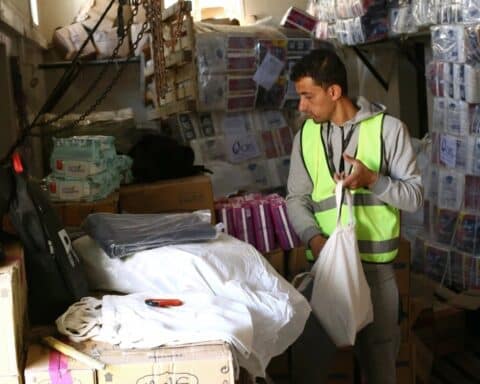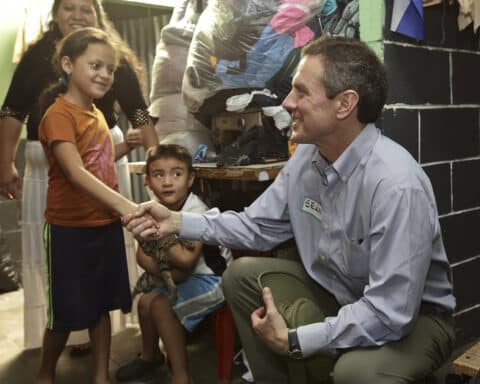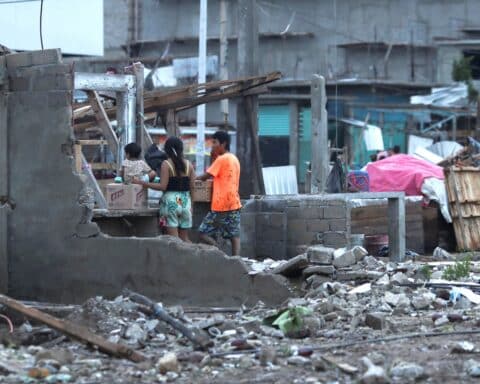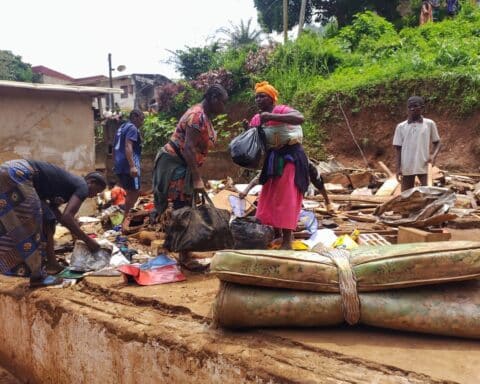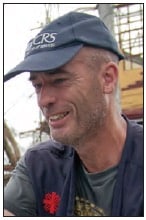
Catholic Relief Services, the official overseas humanitarian agency of the Catholic community in the United States, got its start responding to an emergency. It was a big one called World War II, a massive shock that destroyed lives, homes and livelihoods, sending millions of refugees in search of a new home — whether temporary or permanent.
Since then, our mission has always brought us to the scene of horrific events that have left people in need. It might be something sudden like an earthquake, flood, typhoon or hurricane. Or something that comes on slowly, like a drought. Or it might be another war. Whatever it is, when people are in need, we respond.
Doing more through CRS
For me it started in 2005 when I was on the Catholic Relief Services team that went to Pakistan after a terrible earthquake. I am a civil engineer by training, Irish by nationality. A couple of decades ago, I had a good engineering job in Britain. One day I went to the annual company golf outing where they honored those who were retiring, giving each of them a clock. While I really loved the challenge of being an engineer, I realized that I wanted to do more with my life than get a clock.
I joined an Irish relief agency and was told I was going to Haiti. I thought they said Tahiti. My schoolteacher mother corrected me and told me it was a nation in the Caribbean. I figured it would be like Jamaica, where I had been. It wasn’t. But I fell in love with Haiti, with its culture, art, music and, mostly, people. They have been through so much, but they always bounce back and are so inventive and resilient.
It was in Haiti that I joined Catholic Relief Services. From there, I was sent to Afghanistan. When the tsunami swept through the Indian Ocean on the day after Christmas in 2004, I watched as CRS mobilized so many people and resources to help. By the time the earthquake hit Pakistan the next October, I was on the emergency team.
Lessons learned
At CRS, we have learned many lessons about responding to emergencies over our 75 years. And I have certainly learned a lot during my 14 years in this line of work. One lesson came after an earthquake in Padang in Indonesia in 2009. Houses were destroyed and people were sleeping on the ground. We realized mattresses would help, so we managed to procure a bunch and distributed them in this urban area.
As we were driving out, I was feeling pretty proud of myself and the great job we had done. Then here comes this guy who has about 10 mattresses piled on the back of his motorbike. He was bringing them in to sell, and I realized we had just taken away his business.
It was a harsh lesson to learn, harsher for him than us. It would have been so much better if we had bought the mattresses from that guy, or given people in that community cash vouchers so they could have bought them from him. He probably had a house that was damaged and needed money to repair it, and now, instead of helping him earn that money, we had made him dependent on us.
In every emergency we have to assess and monitor the local market to see if it can meet the demands of what people need. If what they need is available in local shops, it is better to give people cash so they can purchase it themselves. It’s more dignified than standing in queues to receive relief items. It is also a lot more cost effective for us, as the money we would have used for transporting and warehousing relief items can be used to help more families. Giving cash also has a positive effect on the local economy, helping get it back on its feet.
Often after an emergency, generous well-meaning people in the United States want to give something — clothing, food, medicine — to help. But it is better to give cash so people can buy what they need or so we can buy it from local suppliers. Either way, it helps the local economy.
More impact than cameras
One big advantage we have is the scope of Catholic Relief Services. Wherever in the world an emergency occurs, the odds are we — or our partners — already have people working there who know the area, its need and its culture. We’re going to be there, helping people build back better, however long it takes. We don’t leave when the TV cameras do.
And then there is the Church with its reach far down into communities. You expect that in a predominately Catholic country like the Philippines, where we set up in a bishop’s office after Typhoon Haiyan and used Church structures throughout our response. But even in a county like Pakistan you find the Church present, often part of an interfaith network of social services we can tie into.
Every emergency is different. We know we will make mistakes, but we try to learn from them. The most basic lesson is to respect the people on the ground, their knowledge and their dignity. If you do that, if you listen to them, your response will always be more effective.
It is one of the many lessons of Catholic social teaching that guides our work, as well as subsidiarity and solidarity. Integral human development teaches us not to work in silos, not to take care of just one thing — like food, shelter, water or sanitation — but to look at the needs of the whole person.
I never know where I’m going next or what I will find when I get there.
But when I get on a plane to go back home and things are better than when I arrived, I am glad I didn’t wait around for that clock.
Donal Reilly has served in disasters all over the world as deputy director of Catholic Relief Services’ Humanitarian Response Team.

